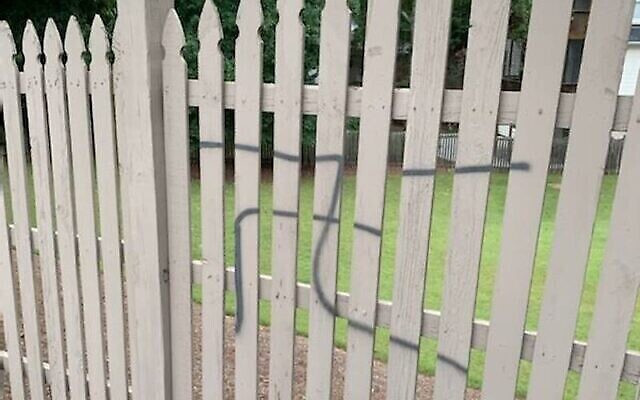2020 YIR: Stand Against Swastikas
When swastikas were found painted on fences in a quiet residential neighborhood, it became a catalyst for a communitywide stand against against hatred.
August 28, 2020
Rabbi Larry Sernovitz had only been the spiritual leader of Temple Kol Emeth about a month when swastikas were painted on residential fences outside a quiet East Cobb neighborhood. The incident led to a communitywide stand against hatred hastily organized by the synagogue and the Anti-Defamation League in Kol Emeth’s lobby. It also led to a Becoming an Ally anti-bias training by ADL and the reformation of the East Cobb Clergy Association, Sernovitz said.
All of the events that developed as a result of the anti-Semitic act of graffiti brought together a cross-section of the interfaith community to unite against a common threat – hatred of “the other,” the rabbis words immediately following the August incident. “Positive things came out of it. “
About 100 people attended two online Becoming an Ally seminars in the months after the vandalism. “Because of what happened, we were able to make a difference.” Congregants from faith-based organizations in Cobb County attended the seminars to train the public how to respond and stand up to hatred and bias.
Sernovitz said the goal of such gatherings is “the ability to change people’s perspective.”
Coming together as a community was especially important to help discuss identity. “It’s an opening to begin to explore what identity looks like and how to look within and understand others,” he said.
“The challenge in our environment can’t be just cliché, … what it takes to clean up our world and what it means to be a diverse community that understands different faiths.”
The conversations over the past few months were “open, honest, vulnerable,” and helped build relationships with people participants may never have met before, learning about their faiths, and making a “big community small.”
The East Cobb Clergy Association had been defunct several years, the rabbi said. Since reforming, the group of about a dozen leaders has met in meetings via Zoom on “what it means to be in community with each other and come together to learn.” While COVID created a challenge to meet in person, Sernovitz hopes in the future the clergy can visit each other’s houses of worship.
Post-election last month, the community came together at a solidarity rally on Zoom. A number of clergy members from mosques, churches and Kol Emeth spoke about “what gratitude means, what unity means,” regardless of political background. It created a stronger sense of community, he said.
Sernovitz, who became spiritual leader of the Reform synagogue when Rabbi Steven Lebow retired in July, said he moved to East Cobb from New Jersey, where anti-Semitism is more common than in Marietta.
He believes young people in the community saw swastikas and the community’s quick response and will “learn resiliency, learn strength, learn what it means to be Jewish. We are not the swastikas; we are not the small amount of hate.” Instead, he looks forward to being a part of the building up, not tearing down of the community.
“Those who seek to hate try to divide us. It actually makes us stronger. It’s a powerful message that we are better together,” he said. “We are not going to completely stop hate, but we can make sure when it does happen, we can respond and build coalitions and partnerships. We have a long history in East Cobb of community no matter, always. … I’m really proud that even in midst of COVID we are able to be the voice of calm and peace. While the whole world changed, our values and our priorities don’t have to.”




comments